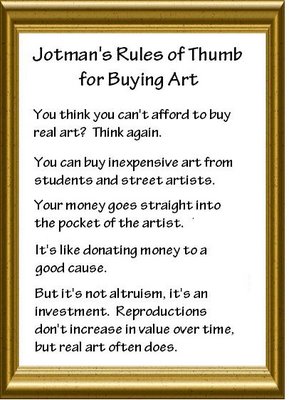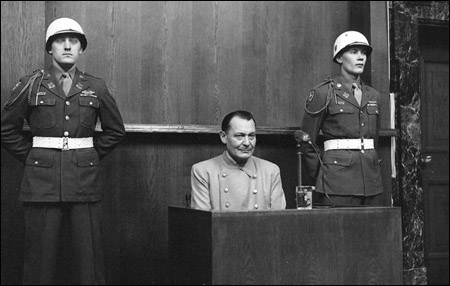 If you don't really care to learn about what you are consuming, consumption is bound to be far less enjoyable for you than it might otherwise have been. You lose. But producers also pay a price for consumer laziness. They lose too. How and why does this happen?
If you don't really care to learn about what you are consuming, consumption is bound to be far less enjoyable for you than it might otherwise have been. You lose. But producers also pay a price for consumer laziness. They lose too. How and why does this happen?
There could be no easier way to explain it than to point to the Chinese village of Dafen. That's because there could be no better symbol of meaningless consumption as a "lose-lose" proposition than the town's recently booming business in art reproductions. Recently Thomas Friedman reported that the town -- global epicenter of fake art production -- has been decimated by the US recession. Friedman writes:
I had no idea that many of those oil paintings that hang in hotel rooms and starter homes across America are actually produced by just one Chinese village, Dafen, north of Hong Kong. And I had no idea that Dafen’s artist colony — the world’s leading center for mass-produced artwork and knockoffs of masterpieces — had been devastated by the bursting of the U.S. housing bubble. I should have, though.

Reading the above passage, I cannot help but wonder why Friedman dignifies the place by calling it an "artist colony." Friedman refers to "mass produced artwork." Another oxymoron. If it is mass produced, it is not artwork.
Of course, many people will refer to reproductions as artwork. But I expect that 90 percent of those who do so are not trying to make a statement about post-modernism, they simply have not taken the time to learn anything about art. Their consumption of fake art is -- by and large -- thoughtless.
Perhaps none of this would matter -- except to a few art connoisseurs -- were it not for the fact that there are real artists out there. It seems self-evident that American artists do not fare well in any bargain whereby new American homes get furnished with made-in-China reproductions.
According to many globalization idealists -- Thomas Friedman seems to be among them -- places like Dafen are models of win-win globalization. Cheap art for American homes, factory jobs for the Chinese.

I don't buy it. Not when I ponder the fate of Chinese artists.
I am thinking about conversations I have had with a number of artists based in different regions of Southeast Asia. It seems to me the big problem, anywhere you go -- from Bangkok to Bali -- is that most Westerners do not buy art thoughtfully. They all seem to want paintings of flowers or Buddha heads or people surfing. Of course, it's worse than that: relatively few Westerners seem to know -- or care -- about the difference between a mass produced object and an original piece of artwork. I once assumed it was only Americans and Australians who bought art like this. These days, many Europeans are equally thoughtless.
Maybe the tourists like the art, you say. If they like how it looks, so what? What difference does it make if everybody does not appreciate the distinction between fake art and the real thing?
It matters to the local people and the local culture. As a result of the thoughtless consumption habits of Western tourists, in shop after shop, many talented local artists have little choice but to spend their days making knock-offs. I have watched real, talented local artists put in such a position. And I find it rather sad.
Because these artists are not living up to their full potential. They have so much more to give than what is asked of them by the Western consumer.
I'm sure in what Friedman chillingly refers to as "Dafen’s artist colony" (it's almost Orwellian "Newspeak" to call it such) any number of Chinese aspire to produce their own original art. Perhaps at one time Dafen -- like a similar place in Bali -- was a
real artists' colony.
The tragedy of globalization is the mindset of the Western consumer.
___
Note: China based journalist Jim Fallows blogged about his visit to Dafen.
Photos: both photos by Jotman. First shows artist I met in Burma holding his daughter. Second, a Bangkok street artist.
 The Telegraph reports:
The Telegraph reports: 









